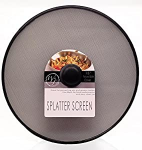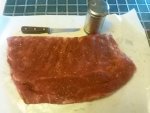 Our grocery store meat is injected with water and sometimes brine it makes the meat juicier and of course, the added weight costs us more. This is all done for the consuming public benefit. (snark) This article is about beef but they do it to pork and chicken also.
Our grocery store meat is injected with water and sometimes brine it makes the meat juicier and of course, the added weight costs us more. This is all done for the consuming public benefit. (snark) This article is about beef but they do it to pork and chicken also.The reason I'm posting about this now is that I am angry and burned. I was cooking bacon this morning and there was so much water in it that it was popping hot grease all over the place and I got it right in my face. I am burned between my eyes and it is really sore, it even splashed on my foot. My glasses protected my eyes. I figure I took one in the name of American greedy meat processors.
the water in your meat
WHAT IS PLUMPING?
Think your 'enhanced' meat is better than the rest? Think again - meat producers are giving you a little 'extra' in the form of water.
While the practice of 'enhancing', 'injecting' or 'plumping' has been around since the 1970s, particularly in the chicken industry, it is becoming a subject of concern in recent years. While many believe injecting meat with salt water helps give the product some added juiciness, there are some unpleasant truths about this practice.
Scroll Down
ENHANCED?
what 'injected', 'enhanced' 'plumped' and 'brined' really means
The practice of injecting meat with saltwater has been around for many years but only recently have consumers become savvy to what it is and why it is done. While brining is a method of preparing meat before cooking, the problem comes in when producers do so without the knowledge of consumers. Meat producers will often cite the practice as ensuring meat stays juicy and flavourful during cooking but the truth is that most do it as a means of increasing the weight of the meat, thus being able to charge more for less product.

THE NEGATIVES
why you should be worried about injected meat
Besides the fact that you are paying extra for saltwater that doesn't actually enhance the meat you're eating, there are some negative health effects associated with injected meat. Firstly, since the product is being injected with a great deal of salt, this often causes consumers to far exceed their recommended daily intake of sodium (between 1500mg - 2300mg). Shockingly, a 100g piece of injected beef can contain up to 1800mg of salt. This is particularly worrisome in a country that has exceptionally high rates of hypertension - a condition that can be curbed by reducing salt intake.


CHECK IT OUT
how to know if your meat has been injected or 'enhanced'
While chicken producers in South Africa are required by law to label whether products have been injected with saltwater, the beef industry has no such regulations in place. Look for a small piece of text which may read “Contains up to 15% broth”, “Contains a solution to enhancwe juiciness” or “Brine injected”. Note that terms such as ‘natural’, ‘fresh’ and ‘100% beef’ does not necessarily mean the meat hasn’t been plumped. If there is no specific information on the label, check if you see pink-coloured water in the bottom of refrigerated trays, it may mean the meat has been injected with water.

 https://www.knowyourbeef.co.za/buyers-advice/plumping/what-plumping-is-and-how-to-spot-it
https://www.knowyourbeef.co.za/buyers-advice/plumping/what-plumping-is-and-how-to-spot-it





